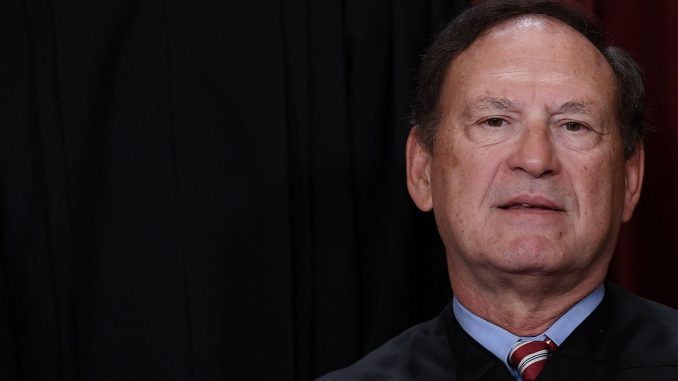
U.S. Supreme Court Justice Samuel Alito recently expressed concern about the decision by Missouri’s state courts to exclude Christians from serving on a particular jury because of their “traditional religious views on questions of sexual morality.
The case at issue involves a woman who identifies as lesbian suing the Missouri Department of Corrections for job discrimination. And Alito is right to be concerned.
Although the judge found that the three potential jurors holding traditional Christian views about sex and human sexuality “were very clear in that they could be absolutely fair and impartial” in deciding the woman’s legal claims, the judge nonetheless struck all three from the jury pool “to err on the side of caution.”
Ponder that chilling decision: A judge disqualified three people from doing their civic duty simply because they believe in God’s plan for sex within a marriage between one man and one woman.
The U.S. Supreme Court on Feb. 20 declined to review this egregiously wrong decision. Alito agreed with that decision, writing that—although the case raised a “very serious and important question” that the high court should address in a future case—a significant procedural issue would have complicated that review in this case.
Nevertheless, Alito said he fears the Supreme Court soon will see other cases in which government excludes Americans from roles of civic responsibility strictly because of their religious beliefs.
The problem? Every American’s constitutional right to trial by jury “necessarily contemplates an impartial jury drawn from a cross section of the community,” the Supreme Court said in the 1946 case of Thiel v. Southern Pacific Co. The judicial system, then, should not reject individuals from serving as jurors by using crude group stereotypes.
The Supreme Court already has determined that it is unconstitutional to exclude women and blacks from jury pools merely because of sex or race.
The same should be true with religion. People shouldn’t be excluded from participating in an important public duty because of their religious beliefs.
Of course, jurors should be excluded from deciding a case when they show specific bias or have conflicts of interest. As Alito wrote: “Jurors are duty-bound to decide cases based on the law and the evidence, and a juror who cannot carry out that duty may properly be excused.”
That is the law and common sense. But nothing like that happened with the excluded Christians in Missouri.
Imagine if, “to err on the side of caution,” we allowed attorneys and judges to exclude groups of Americans from juries because of generalized hunches that they can’t overcome their own opinions to apply the law fairly to the facts presented at trial.
Would we strike all blue-collar workers from juries involving business disputes because of their possible bitterness against the rich? It would be deeply wrong for courts to say Muslims couldn’t be jurors in cases involving Jews, or vice versa—or to exclude atheists from cases involving either faith. Michigan football boosters can fairly decide disputes involving graduates of Ohio State or Notre Dame.
We are all Americans striving to work together responsibly to ensure a just community, not fragmented factions exploiting our fears of each other.
These kinds of group exclusions are especially unconstitutional when they involve religious adherents because, as Alito explained, the Constitution’s free exercise clause protects everyone’s right to practice their religion. Courts inflict unconstitutional disabilities on religious believers when they exclude them from participation in public life simply because of their beliefs.
In the Missouri case, we have little more than an embarrassingly crass prejudice against Christians who believe that it is best to reserve sexual intercourse only for a marriage consisting of one man and one woman.
That prejudice assumes wrongly that Christians will use those beliefs to punish those who disagree with them, even though the Bible teaches believers to love their neighbors as themselves and to treat others the same way they would like to be treated.
Christians believe the Bible’s teachings optimize the common good and human flourishing and should not be wielded as weapons against others. We all need to learn to live together, respecting even those of our fellow Americans who have different ideas than we do.
The Missouri courts here wrongly treated religious Missourans and their beliefs “as subversive of American ideals and therefore subject to unique disabilities,” as Justice William Brennan warned in 1978. Although the Supreme Court declined to review this flawed decision by the Missouri courts, no one should view the high court’s action as authorizing such discrimination in the future against those holding to traditional views on sex.
To do so, make no mistake, would open even wider the door for government officials to exclude anyone from public life whose beliefs they disagree with.
The Daily Signal publishes a variety of perspectives. Nothing written here is to be construed as representing the views of The Heritage Foundation.
Have an opinion about this article? To sound off, please email letters@DailySignal.com, and we’ll consider publishing your edited remarks in our regular “We Hear You” feature. Remember to include the URL or headline of the article plus your name and town and/or state.

